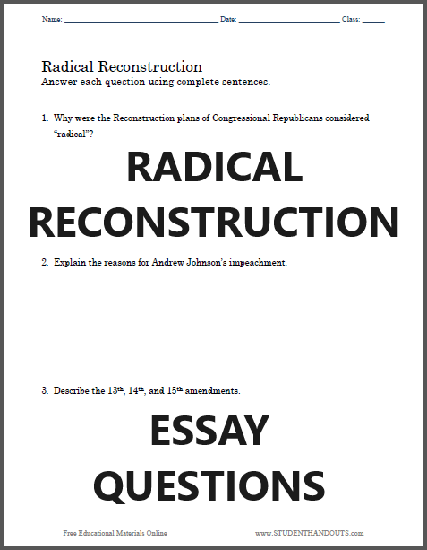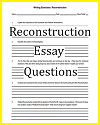| Radical Reconstruction Essay Questions |
|---|
| www.studenthandouts.com ↣ U.S. History ↣ U.S. Civil War ↣ U.S. Civil War Worksheets |
 |
    |
|
Click here to print. Answers will vary. 1. Why were the Reconstruction plans of Congressional Republicans considered "radical"? 2. Explain the reasons for Andrew Johnson's impeachment. 3. Describe the 13th, 14th, and 15th amendments. Andrew Johnson, the 17th President of the United States, faced impeachment proceedings in 1868 for a variety of reasons, primarily stemming from his conflicts with Congress and his approach to Reconstruction following the American Civil War. Here are the key reasons for his impeachment. Clash with Radical Republicans: Johnson, a Southern Democrat who had been Lincoln's Vice President, took office after Abraham Lincoln's assassination in 1865. He clashed with Radical Republicans in Congress, who had a more aggressive approach to Reconstruction than he did. The Radicals wanted to secure civil rights and voting rights for freed African Americans and were critical of Johnson's lenient policies toward the Southern states. Veto of Reconstruction Legislation: Johnson vetoed several pieces of Reconstruction legislation passed by Congress, including the Civil Rights Act of 1866 and the Freedmen's Bureau Act. His vetoes were seen as an attempt to undermine Congress's efforts to protect the rights of newly freed slaves. Defiance of the Tenure of Office Act: One of the primary reasons for Johnson's impeachment was his violation of the Tenure of Office Act, which was passed by Congress in 1867. The act required Senate approval for the removal of certain officeholders, including Cabinet members. Johnson intentionally violated this law by attempting to remove Edwin M. Stanton, the Secretary of War, without Senate approval. Removal of Edwin M. Stanton: Johnson's dismissal of Stanton and his appointment of Lorenzo Thomas as Secretary of War led to a constitutional crisis. Congress believed that the President's actions violated the Tenure of Office Act and were a challenge to the balance of power between the executive and legislative branches. Impeachment by the House of Representatives: In response to Johnson's actions, the House of Representatives voted to impeach him on February 24, 1868. The articles of impeachment charged him with violating the Tenure of Office Act and with bringing disgrace and ridicule to the office of the President. Senate Trial: Johnson's impeachment trial took place in the Senate, with Chief Justice Salmon P. Chase presiding. The trial lasted several months and was a highly charged political event. Johnson was ultimately acquitted by a single vote, falling one vote short of the necessary two-thirds majority for removal from office. Political Factors: While the legal charges against Johnson centered on his defiance of the Tenure of Office Act, the impeachment was also highly political. It reflected the broader divisions and power struggles between the President and Congress during the tumultuous period of Reconstruction. It is important to note that President Johnson's impeachment was not solely based on the merits of the charges but was influenced by the larger political and ideological conflicts of the time. Andrew Johnson remained in office but was politically weakened, and his presidency was marked by ongoing tensions with Congress until the end of his term in 1869. |
| www.studenthandouts.com ↣ U.S. History ↣ U.S. Civil War ↣ U.S. Civil War Worksheets |








